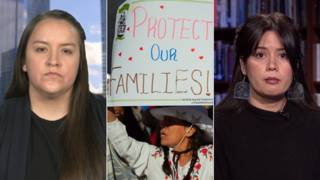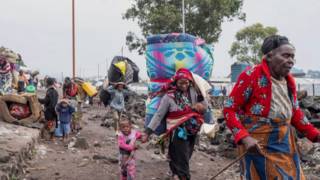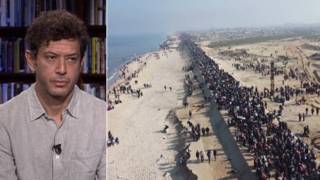HeadlinesApril 09, 2008
Petraeus Urges Freezes on US Troop Withdrawals from Iraq
The top US military commander in Iraq, General David Petraeus, is calling for an end to US troop withdrawals after July. Appearing before two Senate committees alongside US Ambassador Ryan Crocker, General Petraeus said troops need to say in Iraq to protect what he called the gains of the so-called “surge.” Petraeus told lawmakers the security situation in Iraq has improved since last year’s buildup of troops but said the gains are “fragile and reversible.”
General David Petraeus: “As events in the past two weeks have reminded us and as I have repeatedly cautioned, the progress made since last spring is fragile and reversible. Still, security in Iraq is better than it was when Ambassador Crocker and I reported to you last September. And it is significantly better than it was fifteen months ago when Iraq was on the brink of civil war and the decision was made to deploy additional forces to Iraq.”
Petraeus’s plan would leave 140,000 US troops in Iraq — more than before the so-called “surge.”
Sadr Cancels Million-Man March Against US Occupation
On the eve of Petraeus’s testimony, Shiite cleric Muqtada al-Sadr said he was calling off a million-man protest today to mark the fifth-year anniversary of the fall of Baghdad to US troops. In a statement read by spokesperson Salah al-Obaidi, Sadr said he feared the US and Iraqi military would crack down on the protests.
Salah al-Obaidi: “I call those beloved Iraqi people who wish to demonstrate against the occupation to postpone their march, out of my fear for them and my concern to spare their blood.”
Before Sadr’s cancellation, Iraqi forces had set up dozens of checkpoints to block followers from attending the rally. Sadr also renewed his threat to lift a six-month freeze on his group’s military activities. The freeze had been credited with a drop in violence around Iraq until the most recent US-Iraqi offensive. Clashes continue between Shia fighters and US-Iraqi forces in Baghdad. Dozens of fighters and twelve US troops have been killed across Iraq since Sunday. US attacks on Iraqi civilians are also on the rise. An unknown number of civilians were killed in Sadr City Monday when US warplanes bombed a street area. A witness said the US military attacked again after civilians had gathered at the scene.
Witness: “I was heading to Zain al-A’abideen mosque for prayer when the warplanes attacked (this area). When people gathered at scene of attack, the warplanes bombed them again. There were many casualties. What did those people do?”
Study: Lawmakers Invest $196M in Pentagon Contractors
A new study shows members of Congress have collectively invested as much $196 million in military companies under contract with the Pentagon. The Center for Responsive Politics says the holdings could pose a conflict of interest for lawmakers deciding on spending for the Iraq war. More Republicans had military investments than Democrats, but Democrats have more money at stake. The highest stakeholder is Democratic Senator John Kerry. Kerry made at least $2.6 million from his investments between 2004 and 2006. He has up to $38 million invested in companies doing business with the Pentagon.
Protesters Storm National Palace in Haiti over Food Prices
In Haiti, rioting continues over the rising cost of food. On Tuesday, hundreds of people stormed the national palace in Port-au-Prince. United Nations forces fired tear gas and rubber bullets to disperse the crowd. Prices of staples, including rice, beans and fruit, have increased 50 percent over the past year. Protester Jean Alix said the situation has become untenable.
Jean Alix: “We can’t accept this situation we are in. People can’t send their children to school. They can’t do anything for them. Today, we have come to get President Preval to join us and to see what he has decided to do. We can’t go on any longer.”
Haiti’s most vulnerable have resorted to eating dirt to try to ease their hunger. At least five people have died since the protests erupted last week.
Thousands Rally for Tibet in San Francisco
In San Francisco, thousands of people gathered Tuesday to protest China’s treatment of the Tibetan struggle. The vigil came hours before the Olympic flame of this summer’s Beijing Olympics arrived in town for its only North American stop. At a news conference, the former South African Archbishop Desmond Tutu said he does not support an Olympic boycott but urged world leaders not to attend the opening ceremony.
Desmond Tutu: “We are not at the moment calling for a boycott of the games because the athletes have spent a lot of time preparing, and you don’t want to penalize them unnecessarily, but I am certainly calling on heads of state not to attend the opening ceremony, to register their disapproval, their disgust really.”
Several human rights groups have mobilized in San Francisco this week to also call attention to China’s policies in Burma and Darfur. The actor Richard Gere also spoke.
Richard Gere: “This all started on March 10, and it didn’t start about the Olympics. There was a simple demonstration in front of the Jokhang Cathedral, and a vortex opened up, and an enormous amount of energy came out of that, and it’s played into this moment obviously around the Olympics. But I think what is so extraordinary is it was so spontaneous. It was an expression of a people who finally couldn’t take it anymore.”
Tibet has been under military lockdown for the past month since Buddhist monks began protesting Chinese occupation.
Study: American West Warming Outpaces Global Rise
In environmental news, a new study says the American West is warming up at a higher level then the rest of the world. According to the Rocky Mountain Climate Organization, temperatures in the Colorado River are now more than double the average global temperature rise.
White House Rejects Senate Housing Proposal
The White House has rejected a bipartisan Senate proposal to address the nation’s housing crisis. The $15 billion measure included a significant Democrat concession dropping a proposal to allow bankruptcy judges to modify mortgage rates in individual cases. Critics had said the measure would have mostly benefited the homebuilding industry while offering little to millions of homeowners facing foreclosure. But on Tuesday, the White House said the plan still goes too far in aiding homeowners who failed to pay their loans.
Justice Dept. Avoiding Corporate Prosecutions with Questionable, Secretive Deals
And the New York Times is reporting the Justice Department has avoided prosecuting more than fifty major corporations accused of wrongdoing over the past three years. The decline in prosecutions is seen as a deliberate and dramatic shift in policy. Rather than take companies to court for high-profile cases, the Bush administration has relied on “deferred prosecution agreements” that impose fines and appoint an outside monitor to enforce internal changes at the companies involved. The outside monitoring came under scrutiny this year after it was revealed former Attorney General John Ashcroft’s consulting firm won a $50 million government contract to oversee an agreement. Terms of the deals are often kept secret. Companies recently avoiding prosecutions include Monsanto, American Express and Merrill Lynch. Legal experts say the deferred prosecutions may encourage companies to commit wrongdoing, knowing they will likely be able to avoid a costly and public trial if they’re caught. Experts also say the agreements could become even more prevalent as the Justice Department takes on companies accused of wrongdoing in the subprime mortgage crisis.
Most popular
- 1
- 2
- 3
- 4
Non-commercial news needs your support
Please do your part today.











Media Options